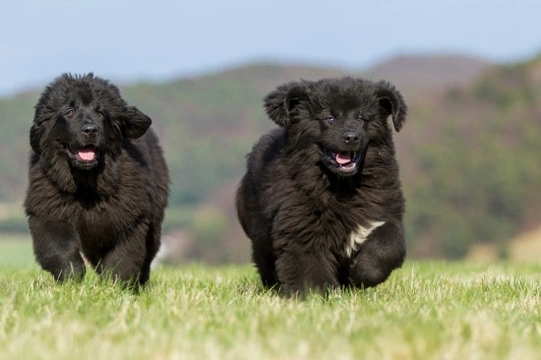
Newfoundland dog hereditary health and health testing
The Newfoundland dog is a giant breed that has a very large, heavy and muscular appearance that can seem very imposing, but these big canines are actually very gentle, calm and kind. Originally bred as a working dog by the fishermen of Newfoundland, the breed are excellent swimmers and very at home in the water, helped along by their unusual webbed feet!
Males of the breed can stand up to 30” tall at the shoulder, and weigh on average up to 70kg, but can often be seen much larger! Females tend to be slightly smaller than males. As well as being tall and heavy, the Newfoundland is also a very long dog, which can measure as much as six feet from nose to tail!
The Newfoundland coat is very dense and rather oily, making it water resistant and not prone to becoming waterlogged when swimming. They can be seen in either brown, black, or black and white, with the latter colour being referred to as “Landseer.”
If you have a soft spot for the gentle giants, the Newfoundland dog may be worthy of consideration as a potential pet, providing that you have enough room to accommodate them comfortably! When considering ownership of any breed, it is of course vital to do plenty of research first, and this is particularly true when considering buying a giant breed such as the Newfoundland. In this article we will look at the hereditary health and recommended health tests for the breed in more detail.
Newfoundland dog average longevity
The average lifespan of the Newfoundland is 8-10 years of age, which is relatively low when compared to the vast majority of other dog breeds, but is well within the average rankings for giant breeds, which tend to live shorter lives than their smaller counterparts.
Newfoundland genetic diversity
The coefficient of inbreeding statistic for the Newfoundland dog is 6.1%, which is within the acceptable range for pedigree dog breeds of 6.25% or lower.
Conformation issues
The general shape and build of the Newfoundland is large and muscular, but considered to be well proportioned and free of exaggerations.
Like most very large breeds of dog, the Newfoundland is at risk of bloat or gastric torsion, a condition in which the stomach fills with gas and may flip over on itself.
The shape of the eyes also makes the breed prone to medial canthal pocket syndrome, in which the eyes create pouches or pockets in the lids, which can collect dirt and debris.
Health testing for the Newfoundland
The British Veterinary Association and The Kennel Club recommend a range of pre-breeding health tests for the Newfoundland dog, due to a hereditary predisposition to certain health problems across the breed as a whole.
Current testing schemes for the breed include:
- Hip score testing, with the mean hip score across the breed being 18.5. Potential parent dogs of the breed should receive a hip score below this level to be considered as viable breeding stock.
- Testing for elbow dysplasia, with the ideal elbow score being zero.
- DNA testing for cystinuria, which leads to the formation of crystals and stones in the bladder.
Newfoundland breed clubs also make the following recommendations:
- Bitches under two or over seven years of age should not to be used for breeding.
- Newfoundland owners participate in breed club heart health testing.
Other health issues
As well as the conditions mentioned above, the Newfoundland has also been identified as having a breed propensity to certain other health issues as well, for which no pre-breeding schemes are currently available. These conditions include:
- Mitral stenosis, a thickening of the mitral valves of the heart, causing heart disease.
- Dilated cardiomyopathy, which can lead to heart failure.
- Subaortic stenosis, which causes heart murmur and may lead to progressive heart failure or sudden heart attack.
- Osteosarcoma, or cancer of the bone.
- Osteochondrosis of the shoulder, due to abnormal cartilage formation that leads to lameness and pain.
- Atopy, a hypersensitivity to certain protein particles, including pollen.
- Either entropion or ectropion of the eyelids.
- Other eye problems such as cherry eye and diamond eye.
- Pemphigus foliaceus, an autoimmune disorder that leads to skin lesions.
- Myasthenia gravis, a disorder of the neuromuscular system that is caused by an autoimmune condition.
- Ciliary dyskinesia, a condition that leads to affected dogs suffering from recurrent respiratory infections.
- An autoimmune disorder called meningitis syndrome, which can lead to polyarthritis.
- Polymyositis, a condition that leads to excessive drooling and saliva production, as well as trouble swallowing. This is another autoimmune condition.
- Hypothyroidism, or an underactive thyroid gland, which can lead to weight gain and lethargy.
- Panosteitis, an inflammatory condition of the bones.
- Cranial cruciate ligament weakness, caused by a degeneration of the ligaments of the knee joints that can cause the ligaments to rupture. This is very painful and leads to severe lameness. This condition can often be corrected with surgery.



